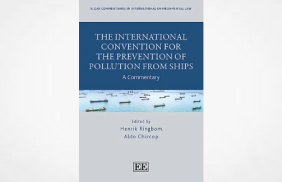The International Convention for the Prevention of Pollution from Ships
A Commentary
This Commentary presents an in-depth exploration of what is widely regarded as the most important International Maritime Organization (IMO) convention on vessel source pollution. Leading international experts provide an authoritative analysis of the International Convention for the Prevention of Pollution from Ships 1973/78 and its subsidiary instruments, collectively known as MARPOL.
Key Features:
? Examines the MARPOL system in detail including its annexes and regulations
? Investigates the history, purposes, rationale and regulatory approach of MARPOL
? Identifies legal and regulatory issues as well as the challenges of implementation and enforcement
? Emphasizes the vital role that MARPOL has played in the protection of the marine environment from all forms of shipping
The International Convention for the Prevention of Pollution from Ships is invaluable to practitioners and professionals in ministries and departments of transport, national maritime administrations, intergovernmental organizations, shipping industries and international NGOs. It is also an essential resource for students and academics in international environmental law, law of the sea and international maritime law.




